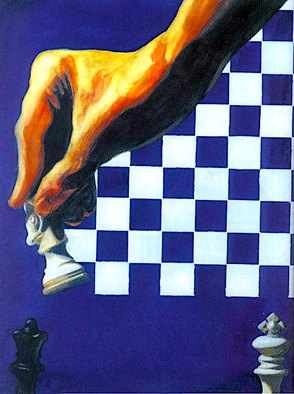mNo edit summary |
m (→Sidhe Impulses) Tag: Visual edit |
||
| Line 2: | Line 2: | ||
== Sidhe Impulses == |
== Sidhe Impulses == |
||
| − | + | There are many political philosophies among the Sidhe of Concordia. Most of them fit into one of the three categories listed below. |
|
* [[Traditionalist (CTD)|Traditionalist]] |
* [[Traditionalist (CTD)|Traditionalist]] |
||
* [[Reformer (CTD)|Reformer]] |
* [[Reformer (CTD)|Reformer]] |
||
| Line 14: | Line 14: | ||
== Sidhe Impulses vs. Commoner Politics == |
== Sidhe Impulses vs. Commoner Politics == |
||
| − | Why do the sidhe have Traditionalists, Reformers, and Modernists while the commoners use words like Conservative, Moderate, and Radical? Aren't they mirrors of each other? Don't some commoners use the sidhe terms to refer to themselves? Well, yes to all the above... with some caveats. |
+ | [[File:Sidhe29.png|thumb|294px]]Why do the sidhe have Traditionalists, Reformers, and Modernists while the commoners use words like Conservative, Moderate, and Radical? Aren't they mirrors of each other? Don't some commoners use the sidhe terms to refer to themselves? Well, yes to all the above... with some caveats. |
It is certainly true that some of the older commoners still like to refer to themselves by the sidhe terms. But the younger and trendier commoners is a growing movement that advocates commoners choosing their own words to describe their politics. Using sidhe terms is just another way of coming under the thumb of the Shining Host. Many groups throughout history have done this, seizing on a word to describe themselves rather than using the term an enemy or oppressor prefers. Many commoners don't feel quiet so negatively about the sidhe, but many still like using their own frame of reference. |
It is certainly true that some of the older commoners still like to refer to themselves by the sidhe terms. But the younger and trendier commoners is a growing movement that advocates commoners choosing their own words to describe their politics. Using sidhe terms is just another way of coming under the thumb of the Shining Host. Many groups throughout history have done this, seizing on a word to describe themselves rather than using the term an enemy or oppressor prefers. Many commoners don't feel quiet so negatively about the sidhe, but many still like using their own frame of reference. |
||
Latest revision as of 01:40, 3 January 2020
In the common parlance of the Kithain, an Impulse is one of the political persuasions of Concordian Political Life.
Sidhe Impulses
There are many political philosophies among the Sidhe of Concordia. Most of them fit into one of the three categories listed below.
Commoner Politics
Commoner politics are fairly straightforward and much less murky than mortal ones. They have three key political viewpoints, and practically all commoners adopt one of them. As with many mortals and sidhe, they also tend to move in a circle through those viewpoints during their lives. Childling commoners tend to see fae society in clear shades of black and white; they haven't lived long enough to understand the shades of grey and generally prefer to rely on long-standing tradition. Of course, that's the broad angle. Some commoners stay with one view all their lives.
Sidhe Impulses vs. Commoner Politics

Why do the sidhe have Traditionalists, Reformers, and Modernists while the commoners use words like Conservative, Moderate, and Radical? Aren't they mirrors of each other? Don't some commoners use the sidhe terms to refer to themselves? Well, yes to all the above... with some caveats.
It is certainly true that some of the older commoners still like to refer to themselves by the sidhe terms. But the younger and trendier commoners is a growing movement that advocates commoners choosing their own words to describe their politics. Using sidhe terms is just another way of coming under the thumb of the Shining Host. Many groups throughout history have done this, seizing on a word to describe themselves rather than using the term an enemy or oppressor prefers. Many commoners don't feel quiet so negatively about the sidhe, but many still like using their own frame of reference.
Think of politics like a continuum. Put the sidhe Traditionalists on the far right and commoner Radicals on the far left, add commoner Conservatives, sidhe Reformers, Commoner Moderates, and sidhe Modernists. Regardless of how modern their thinking may be, ninety-nine percent to f the time, sidhe are still going to be a little more to the right than a commoner radical. Of course, the continuum is just a model. Many commoners are going to fluctuate depending on the issue and their mood at the time.
Southern Impulses
Unseelie Impulses
Like their Seelie counterparts, much of the Shadow Court’s maneuverings revolve around the various members’ political beliefs. The Seelie content themselves with three major political impulses, and believe that these are echoed by corresponding Unseelie versions. While there are some similarities, the Seelie have no understanding of or appreciation for the subtleties inherent in the Unseelie viewpoint; subtleties that lead the Shadow Court to embrace five political forces rather than three. Each political impulse is associated with one or more of the seven goals (or tenets) of the Shadow Court, though none of them agree to all of them. Further confusing the political scene are the cliques who band together along political lines. Regardless of whatever else they believe, however, all the factions have one goal in common which allows them to act in concert and provides a common ground for the Shadow Court’s meetings: the overthrow of the Seelie Court.
References
- CTD. Nobles: The Shining Host, p. 5.
- CTD. Kingdom of Willows.
- CTD. The Shadow Court, pp. 29-31.
